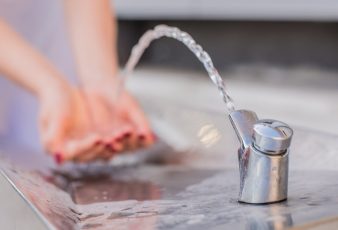During the particularly hot summers, it is almost impossible to imagine going a single day without AC for most of us. We have grown accustomed to a certain level of comfort and are unwilling to give it away.
However, once we have overcome that problem, we encountered a new one, which is related to it – the ACs we installed in our homes seem to dry out our air.
We asked heating and air conditioning experts at Hughes Air Conditioning & Heating Repair to tell us why this happens and what we can do about it.
What Is Air Humidity?
The air which we breathe has a certain amount of water vapor dissolved in it, the so-called air humidity. The concentration of this water vapor depends on the climate, weather conditions and many other factors.
Your indoor air is likely not much different than the air outside (except if you use an air humidifier, but more on those a bit later). However, when you turn on your AC, you start a process which can and usually does remove the humidity from the air around you.
How Does the AC Dry Your Air?
First of all, it is important to note that removing humidity from your home is an unintended side effect of the cooling process. In order to cool your home, ACs use evaporator coils which are full of chilled compressed gas.
The cold of the evaporator coils attracts the water vapor, condenses it into the water and then is drained into the pipe which leads it out.
Why Air Humidity Is Important
Even though high humidity can feel a bit oppressive and difficult to bear, the lack of humidity in the air can be just as bad, and probably even worse. When it comes to the immediate effects it can have on the human body, the first one that comes to mind is drying up your skin.
Dry skin can lead to some health problems, but the more important effect is perhaps not so obvious to you immediately. However, dry air can irritate your sinuses and even your throat, leading to the inflammation and all other unpleasant health problems.
What Can You Do About It?
So, knowing that the loss of humidity is not great, you should probably do something about it, right? In some cases, this may not be necessary, especially if you have a newer HVAC system installed in your home. These systems typically include a built-in humidifier which adds the necessary moisture which was lost through the process of cooling.
If your AC system does not have a humidifier, one option is to turn the whole system off. However, given the temperatures outside, that is not very likely.
Instead, you could consider buying a separate humidifier to work alongside with your AC. These devices are fairly common and useful, but they do require care and maintenance on a weekly basis and can be quite loud at times.
Rational Use of the AC
In recent years, there has been a call to limit and manage the use of AC. The main reason for this call is the energy consumption which typically skyrockets during the summer, putting an extra strain of the electrical grid.
However, managing air humidity is also important, so by using your AC less, you can actually help manage your air quality. Smart homes are capable of turning on and off many devices in your home, including the AC. So, instead of having to choose between coming to an overheated house and blasting your AC all day even though you are not there, you can pick the third option – being smart with your AC use.
Read Also:




























